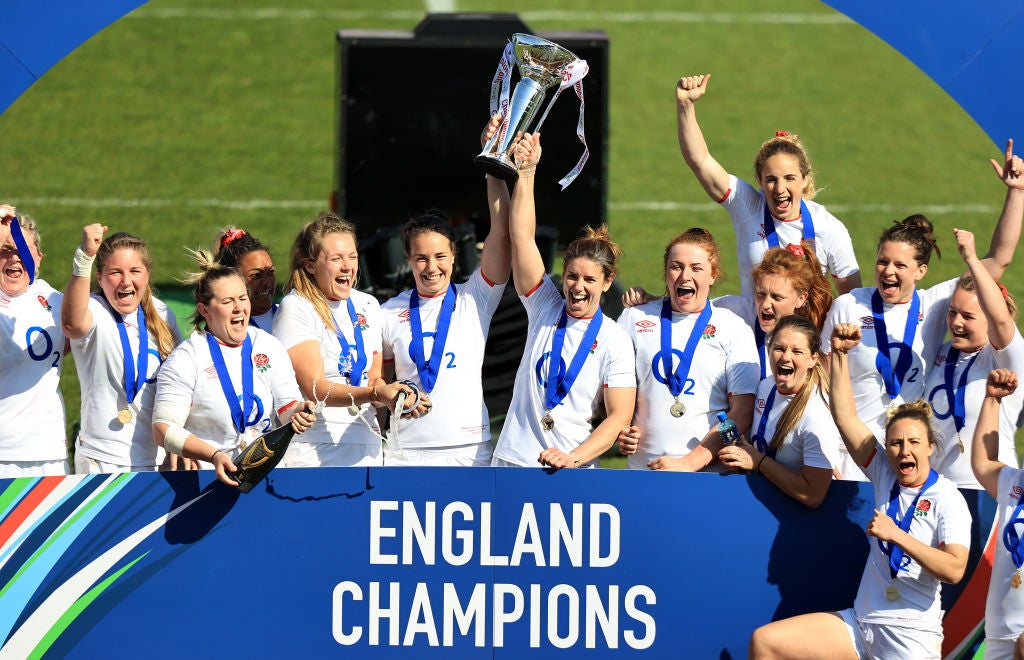England achieve Six Nations glory and objectives despite imperfect final performance
A third straight Six Nations triumph underlines England’s status among the best

Those watching on BBC Two would have been reminded that brutalist architecture does have its charms. Free-flowing, extravagant romp in spring sunshine it may not have been but the first Women’s Six Nations Final brought eighty minutes of defensive ferocity that again ended with aching English limbs thrown aloft as streamers and confetti drifted on the breeze.
“Ultimately, the aim was to win the Six Nations and we’ve managed to do that,” said Emily Scarratt after lifting the trophy. “Sometimes it doesn’t need to be big, flamboyant scorelines and it certainly wasn’t a perfect performance.
“The defence was unreal and we had to dig in. It wasn’t pretty out there a lot of the time and we had to work incredibly hard. You don’t get many opportunities to be in big games like that so we definitely enjoyed it.”
It was gritty, messy and at times uncouth, but there can be no doubting the commitment of either side as they hammered against locked doors. The grunt and graft of Cath O’Donnell, Marlie Packer and Zoe Aldcroft, among others, gave England enough solidity and strength to survive the considerable French rigours, while it was little surprise to see Sarah Hunter remind doubters of her qualities with an impactful and steadying arrival from the bench.
To see her combine with Scarratt to hoist England’s prize, an action that would not have been possible while she battled a neural issue in her hand in the autumn, was an image of both resilience and triumph.
Eight successive wins against the French and three Six Nations titles on the bounce without defeat are indicative of England’s strength, but the manner of a nip-and-tuck final showed that France are very much on their heels, and revenge will be on the mind when the two sides reunite on Friday night in Lille.
Elsewhere, it was also a day that showed the merits of this competition as evenly-matched sides met, a useful reminder after largely one-sided victories in group play. Ireland solidified their place as the best of the rest, as it were, though Italy showed their considerable potential, and Scotland, short of two talismanic back-rowers, secured fifth spot. Those three will jockey with Spain for a place at next year’s World Cup in a qualifying tournament still to be scheduled. All four will fancy their chances.
Wales, along with England and France, are already qualified for the World Cup in New Zealand, and Warren Abrahams is a promising hire, but they have not kicked on or invested as perhaps should have been expected. The unexplained, abrupt departure of former captain Rachel Taylor from her newly-taken role as skills coach hints that all may not be rosy behind the scenes – perhaps another wooden spoon will cause enough of a stir to compel action.
There is plenty to mull for the competition organisers, too. There is general agreement that a standalone window for the tournament away from the men is both a positive and necessary threat, with players revelling in the spring sunshine and increased attention.
Of more debate is the future format – while the occasion of a Six Nations final appeals, there should be little appetite to maintain any structure that limits playing opportunities for nations that need time and chances to develop.

While stark inequalities in investment in structures and domestic rugby remain then on-field mismatches will, unfortunately, continue to occur with England and France clear at the top. The tournament must remain a free-to-air television product, though, to continue to drive the sport forwards and encourage investment.
For those two sides, there is little time to commiserate, celebrate or lick wounds with a short week of preparation. Of concern for Simon Middleton will be a scrummaging unit that appears to have certain fragilities in the absence of first-choice props Sarah Bern and Hannah Botterman, and a kicking game, normally a point of difference for England, that was inaccurate in breezy conditions at the Stoop, with Middleton believing his side kicked “probably a little bit too often”.
In better news for England’s head coach, a scan on Poppy Cleall’s arm suggests the outstanding English player of the tournament may be available next week; the midfield will need to be readjusted, however, as Helena Rowland returns to Great Britain Sevens preparation.
England are keen for playing opportunities against southern hemisphere and North American foes to better gauge where they are should the pandemic allow, but for now they will make do with a trip another meeting with their cross-Channel rivals. You would perhaps have forgiven a week of recuperation but the opportunity for another test against France is a vital one. Though the glare of the final lights will be lifted, another bruising battle between the Six Nations’ finest awaits.
Join our commenting forum
Join thought-provoking conversations, follow other Independent readers and see their replies
Comments
Bookmark popover
Removed from bookmarks